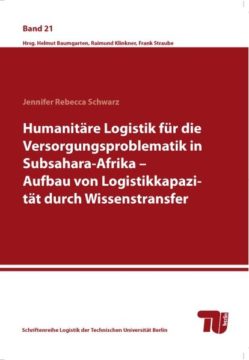Humanitarian logistics has recently gained significance in research and practice. With up to 80 percent of costs caused by purchasing, transportation and warehousing it is increasingly considered key to efficient and effective disaster management. Particularly the occurrence of epic disasters like the Haiti earthquake in 2010 or the Pakistan flood in 2010 draws global attention to humanitarian logistics due to millions of affected people that rely on humanitarian assistance. 83 percent of the victims of natural disasters occur in developing or emerging countries. Especially the poorest of the poor lack the capability to prepare themselves. The infrastructure in these countries is already insufficient under regular circumstances and often completely destroyed or damaged during the event and therefore not accessible to emergency response teams. This is particularly true for the continent of Africa where about 35 percent of the population is affected by malnutrition and about 80 percent is excluded from health care. At the same time Africa – besides Southeast Asia – is the most disaster prone continent, particularly exposed to droughts, floods and epidemics but also man-made hazards. Under consideration of the given situation in sub-Saharan Africa a research was carried out by a research team at the Berlin University of Technology from 2009 to 2011 in order to identify solutions to enhance the livelihood of the poorest of the poor. The results of this research project have been modified and extended for this dissertation. In the core of this research is the lack of logistics knowledge, taking into consideration country specific factors. It has been found that neither the awareness for nor the importance of humanitarian logistics is commonly known in sub-Saharan Africa. Therefore a two-staged transfer model has been developed, each consisting of four main phase in order to identify and transfer necessary logistics knowledge under consideration of empirical studies as well as country-specific factors for building up humanitarian logistics capacity. The dissertation ends with a case study applying the proposed procedure is approach.
- Veröffentlicht am Dienstag 18. Dezember 2012 von Universitätsverlag der TU Berlin
- ISBN: 9783798324442
- 336 Seiten
- Genre: Gesellschaft, Politik, Sachbücher, Volkswirtschaft, Wirtschaft
